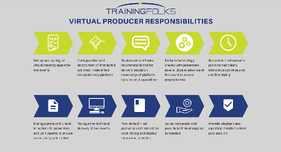Produce Virtual Training | 5 Tips for Success

If you're considering hiring a virtual producer for your next project, there are a few key things you should know before making your decision. We'll go over the top five things to consider when hiring a virtual producer, including their experience, communication skills, and ability to manage a remote team.
By understanding these key factors to produce virtual training, you can ensure that you find the right virtual producer for your project and achieve your goals. So, let's dive in!
5 Tips for Success
Hiring a virtual producer is a great way to elevate virtual training, but it's important to consider these five key factors before making a decision. Experience, communication skills, project management, technical skills, and cultural fit are all essential elements that will help ensure a successful project. With the right virtual producer, you can achieve your goals and take your project to the next level.
1. Experience
One of the most important factors to consider when hiring a virtual producer is their experience. Look for someone who has a proven track record of managing successful virtual projects and who understands the unique challenges that come with working remotely. A virtual producer with experience will be able to navigate any obstacles that arise and ensure that your project stays on track.
2. Communication Skills
As a virtual producer, your primary mode of communication will be online, so it's essential to find someone who is able to effectively communicate through email, instant messaging, and video conferencing. A virtual producer with strong communication skills will be able to keep all team members on the same page and ensure that everyone is working towards the same goal.
3. Project Management
A virtual producer must have the ability to manage a project, delegate tasks, and keep everyone on schedule. This is important because a virtual team often lacks the face-to-face interaction that can help keep a project on track. A virtual producer should have a strong understanding of project management tools and techniques to ensure that the project is completed on time and within budget.
4. Technical Skills
A virtual producer should be familiar with the technology that you plan to use for your project. Whether it's a specific software or a specific type of equipment, your virtual producer should have the knowledge and experience to handle any technical issues that may arise.
5. Cultural Fit
Lastly, finding a virtual producer who will fit well with your team's culture is essential. A virtual producer who aligns with your company's values and work ethic will be more likely to understand your needs and work well with your team.
These are all key to being able to produce virtual training successfully.
Benefits of Working with a Virtual Producer
Working with a virtual producer has several benefits. Firstly, it allows for greater flexibility in terms of location and time, as virtual producers can work from anywhere and are not constrained by geographical boundaries. This means that you can hire the best talent, regardless of where they are located.
Virtual producers can bring a diverse range of skills and experience to a project, as they often work with multiple clients and industries. Additionally, virtual producers are often able to work more efficiently and effectively as they can focus on the task at hand without the distractions of a traditional office environment. Overall, working with a virtual producer can greatly enhance your project's potential for success.
Services That Trained Virtual Producers Can Offer
Trained virtual producers can offer a wide range of services to support your project. Some of these services include:
-
Project management: Virtual producers can help you plan, organize and execute your project, by creating timelines, setting goals, and managing the budget.
-
Communication and coordination: Virtual producers can help you communicate with your team members and coordinate their efforts, by using various communication tools such as email, instant messaging, and video conferencing.
-
Technical support: Virtual producers can help you with any technical issues that may arise during your project, by troubleshooting and providing solutions.
-
Content creation: Virtual producers can help you create and recommend updates to the content for your training programs, by working with writers, editors, and designers to produce high-quality materials.
-
Event planning: Virtual producers can help you plan and organize virtual events, such as webinars and webcasts.
-
Virtual team management: Virtual producers can help you manage a remote team, by managing the virtual experience, providing guidance, setting expectations, and ensuring that everyone is working well in the virtual environment.
-
Quality assurance: Virtual producers can help you ensure that your virtual training class meets the desired quality standards, by reviewing and testing the training material before a live session.
Overall, trained virtual producers can offer a wide range of services that can support your project and help you achieve your goals.
Don't need a full-time virtual producer? TrainingFolks Virtual Training Producer Service can provide you with virtual producers for when you have your training events.
If you found this blog helpful and want to learn more,
be sure to download our FREE Infographic:
'Virtual Producer Responsibilities'


